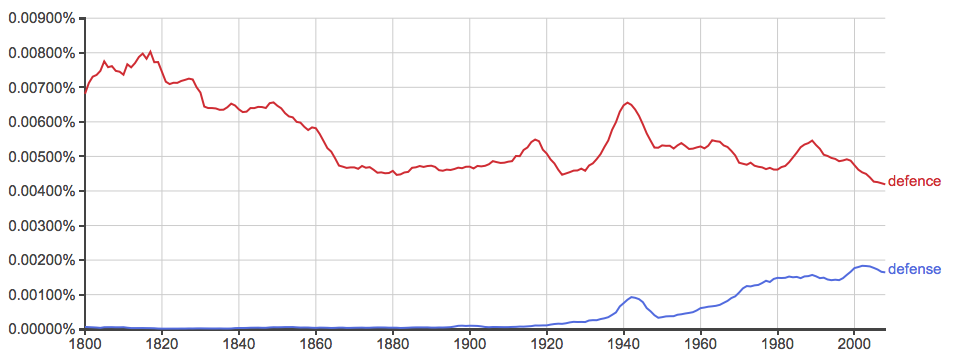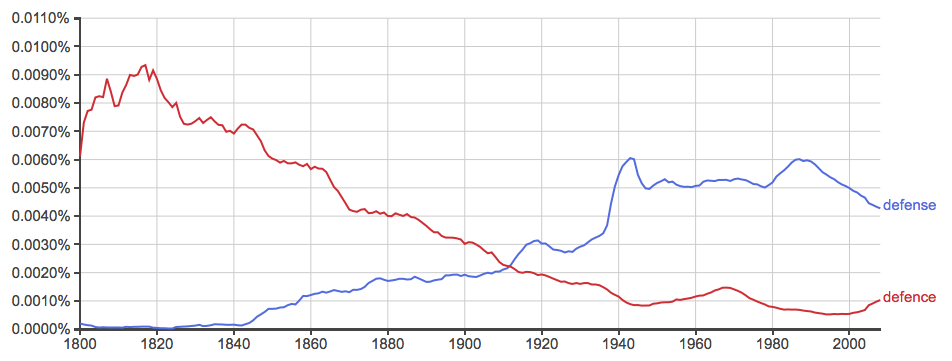The words defence and defense can be confusing for those not sure of their differences, and not knowing which to use can cause a writer to second-guess his or her work, even though there might not be anything wrong with it.
Do these words have different meanings or different functions in a sentence? Are they just variants of the same word? How exactly are they pronounced?
In this post, I want to answer each of these questions so that you will never again have to second-guess yourself while writing either defence or defense.
What is the Difference Between Defence and Defense?
Defence and Defense are both nouns, and they have a few different meanings.
- The act of defending against attack, danger, or injury.
- The act of defending a legal case.
- The team or those players of a team attempting to stop the opposition from scoring.
Here are a few sentence examples,
- The enemy attacked us, but thankfully we had a strong military defense ready to deploy.
- The defence presented its case powerfully.
- The Green Bay Packers’ defense is the best in the league.
Okay, you are probably still wondering, “How do I know which one to use?”
The answer to that question is surprisingly simple, as the only thing separating these two spellings is a dialectal difference.
That’s right; there is no difference in meaning or function between defence and defense. They are simply different spellings of the same word.
When to Use Defence
 Although, there is no difference in meaning between the spellings, you should always keep your audience in mind when writing these words.
Although, there is no difference in meaning between the spellings, you should always keep your audience in mind when writing these words.
Defence (spelled with a “c”) is the preferred spelling of the word in British English. If you find yourself writing to a primarily British audience or for a British publication, this is the correct spelling for you.
For example, Fowler’s, a well-known British usage guide, lists defence as the preferred British English spelling.

In fact, if you graph out defence vs. defense in British English book publications, you can see that it is used much more frequently. Defence is also more common in Australia and Canada than it is in American English.
It is worth noting, however, that the American spelling defense appears to be gaining ground “across the pond,” as you can see a clear uptick in defense in the last 50 years or so. Perhaps one day the preference will be reversed, but for the time being defence is still the British English spelling.
When to Use Defense
 Defense (spelled with an “s”) is the preferred spelling of the word in American English. If you find yourself writing to a primarily American audience or for and publication in the United States, defense is the correct spelling for you.
Defense (spelled with an “s”) is the preferred spelling of the word in American English. If you find yourself writing to a primarily American audience or for and publication in the United States, defense is the correct spelling for you.

If you graph defense vs. defense across American book publications, you can see that for the last 100 years, defense has been the preferred spelling and, as we saw above, is gaining worldwide influence.
Some claim that this spelling is a better spelling of the word because it more closely resembles the word from which it was derived (the Latin dēfēnsa) and has a greater consistency with other words like defensible.
Defences or Defenses?
For example, the American-British spelling distinction doesn’t carry over to all derivatives of defence/defense.
It holds true for words like defences / defenses, and defenceless / defenseless, but not for other words like defensive, defensiveness, defensively, and defensible.
The words defensive, defensiveness, defensively, and defensible are spelled with an “s” everywhere in the English-speaking world.
Pronunciation of Defence / Defense
How do you pronounce defense? The traditional pronunciation of defense is with the stress on the second syllable.
- Defense = di-fen[t]s
As a result of sports commentators, however, it is now common to hear defense pronounced with the stress on the first syllable in athletic contexts.
- Defense = dee-fen[t]s
If you talking about a military or legal strategy, you should use the first pronunciation. The second pronunciation is limited only to sports related contexts.
Can Defense Be a Verb?
In any bit of formal writing, defense is not to be used as a verb.
It is, occasionally, used in sports related contexts to mean, “defend against.”
- The Chicago Bulls defensed (defended against) the Detroit Pistons offense spectacularly tonight.
Even in sports related contexts it is uncommon and should be avoided. For example, The AP Stylebook says never to use defense as a verb.
Remember the Difference
Given that the difference between these two words is similar to the difference between offense and offence, I will give you the same trick to remember defence vs. defense.
Defence is the British spelling and has a “C” in it. Think of this “C” as representing the Royal Crown of the United Kingdom.
Defense is the American spelling and has an “S” in it. Think of this “S” as representing the word “States” in United States.
Summary
Is it defense or defence? While these words have the same meaning, they are spelled differently in different regions. It’s important that you keep your audience in mind when using defense vs. defence.
Defence (spelled with a “c”) should be used in British English.
Defense (spelled with an “s”) should be used in American English.
In all uses other than sports, the pronunciation with the stress on the second syllable is preferred.
Contents
